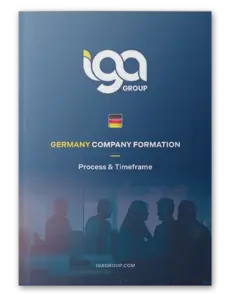Germany
Company Formation
Germany, a powerhouse of innovation engineering and manufacturing ranks among the world’s largest and most advanced economies. As a key member of the European Union establishing a company here provides direct access to the EU single market positioning it as a strategic hub for businesses aiming to operate across Europe.
With its highly skilled workforce stable political landscape and robust legal system Germany attracts multinational corporations SMEs and start-ups. The nation’s reputation for regulatory transparency and strong infrastructure makes it an ideal destination for ambitious enterprises seeking a solid foundation for growth.
?
Why Germany
- Germany offers a transparent and well-regulated environment with a strong legal framework, beneficial for establishing an iGaming operation’s holding or service company.
- While direct EU-wide iGaming access varies, Germany provides a solid base for structuring international iGaming ventures and ensuring compliance.
- Significant tax benefits are available, including potential exemptions on dividends and capital gains from qualifying subsidiaries in other regulated iGaming markets.
- Access to a highly skilled workforce in technology, marketing, customer support, and other areas crucial for iGaming businesses.
- Excellent digital networks and overall infrastructure to support the demands of online gaming operations.
- Establishing a presence in Germany can boost an operator’s reputation and credibility within the European iGaming landscape.
- Germany’s strong legal and economic standing provides a solid foundation for international expansion and efficient iGaming operations.
Key Contacts
Alexia Panzavecchia
Claire Marie Calleja Zammit
Downloads
Useful Links
Key Information Overview
| Types of Companies | Private Limited Company (GmbH): Standard for SMEs. | |
| Minimum Share Capital | GmbH: €25,000 fully paid during incorporation. AG: €50,000 minimum, with 25% (€12,500) payable upfront. Branch offices require no capital. | |
| Registered Office | Physical German address required for GmbH/AG (no virtual offices). Branches must register the parent company’s legal address. Commercial rental contracts typically needed. | |
| Shareholders & Directors | GmbH/AG: Minimum 1 shareholder (individual/entity) and 1 director. AGs require a two-tier board (Management Board + Supervisory Board). No residency requirements for GmbH directors. | |
| Bank Account | German business account mandatory for GmbH/AG to deposit share capital. Branches may use parent company’s account but need a German tax account. | |
| Tax Regime | - 15% corporate tax + 5.5% solidarity surcharge (16.5% effective). - Municipal trade tax (14-17%, location-dependent). - VAT (19% standard rate). | |
| Time to Complete Incorporation | GmbH: 2-4 weeks (notarization delays possible). AG: 4-6 weeks (longer if stock prospectus needed). Branch: 1-2 weeks. | |
| Annual Maintenance Costs | GmbH: €2,000-€5,000 (accounting, trade tax filings, compliance). AG: €10,000+ (audits, stock compliance). Excludes personnel costs. | |
| Audit Requirements | GmbH: Only if exceeding 2/3 of: €6M balance sheet, €12M revenue, or 50 employees. AG: Always mandatory. Branches follow parent’s rules. | |
| Market Access | Full EU market access under freedom of establishment. Strong domestic economy (€4.2T GDP). Dual VAT registration possible for intra-EU trade. | |
| Key Benefits | - Skilled workforce: 86% labor participation. - Legal stability: Ranked #6 in global rule of law index. - Infrastructure: Top-tier logistics and digital connectivity. | |
| Legal Framework | German Civil Code (BGB) and Commercial Code (HGB). EU directives supersede local laws. English contracts valid but German versions govern disputes. | |
| Physical Presence Requirements | GmbH/AG must maintain a registered office (can be serviced address). Branches require a local representative. | |
| Corporate Governance Requirements | GmbH: Annual shareholder meeting. AG: Quarterly board meetings + annual general meeting. Minutes must be in German. | |
| Language Requirements | Articles of Association must be in German. Bilingual documents accepted for day-to-day operations. Court proceedings require certified translations. | |
| Tax Residency Rules | Companies managed from Germany are tax-resident. Branches taxed only on German-sourced income. Controlled Foreign Company (CFC) rules apply. | |
| Required Documents | - GmbH/AG: Notarized articles, passport/ID copies, capital proof, office lease. - Branch: Parent company’s incorporation certificate (apostilled). | |
| Compliance & Reporting | - Annual: Financial statements, trade tax returns. - Monthly/Quarterly: VAT filings. - Event-based: Shareholder changes (within 2 weeks). | |
| Employee and Payroll Requirements | Mandatory social security contributions (18.6-28% of salary). Works council required if >50 employees. Minimum wage: €12.41/hour (2024). |
Types of Companies
GERMANY OFFERS A DIVERSE RANGE OF CORPORATE STRUCTURES DESIGNED TO ACCOMMODATE VARIOUS BUSINESS NEEDS, FROM NEW VENTURES TO LARGE INTERNATIONAL ORGANIZATIONS. CHOOSING THE RIGHT LEGAL FORM IS A CRITICAL DECISION WITH SIGNIFICANT LEGAL & TAX IMPLICATIONS.
01
Gesellschaft mit beschränkter Haftung (GmbH) – Private Limited Company
- The GmbH is the most prevalent company type in Germany, particularly suitable for small and medium-sized enterprises. It provides limited liability to its shareholders, generally restricting their risk to their capital contributions. A GmbH requires at least one director.
- Minimum share capital requirement: €25,000, of which at least half (€12,500) must be paid in upon formation.
02
Aktiengesellschaft (AG) – Public Limited Company
- The AG is typically chosen by larger businesses intending to raise capital through public offerings or seeking listing on stock exchanges. Similar to the GmbH, it offers limited liability to shareholders. An AG has a management board (Vorstand) and a supervisory board (Aufsichtsrat).
- Minimum share capital requirement: €50,000.
03
Branch of a Foreign Company
Foreign companies can establish a branch (Zweigniederlassung) in Germany, allowing them to operate as an extension of the parent company without creating a separate legal entity. The branch is legally dependent on the foreign parent company, which retains full liability for the branch’s obligations. The branch must be registered in the German commercial register.
04
Sole Proprietorship (Einzelunternehmen)
This structure is suitable for individuals conducting business independently. However, it does not provide limited liability protection, meaning the owner is directly and fully liable for all business debts and obligations. It is a straightforward structure for individual business owners.
05
Partnerships
While not corporations in the same way as GmbH & AG, partnerships are important business structures in Germany:
- Offene Handelsgesellschaft (OHG) – General Partnership: An association of two or more persons where all partners have unlimited liability for the partnership’s debts.
- Kommanditgesellschaft (KG) – Limited Partnership: Consists of at least one partner with unlimited liability (the Komplementär) and at least one partner with liability limited to their capital contribution (the Kommanditist).
06
Special Purpose Vehicles (SPVs)
Germany’s robust legal system, efficient regulatory processes, availability of sophisticated professional services, and favorable tax framework make it an attractive jurisdiction for Special Purpose Vehicles (SPVs), particularly in sectors like real estate, financial services, and investment. Legal certainty and a well-developed financial infrastructure contribute to its appeal.
Holding Company
An SPV established primarily to hold controlling interests in other companies (subsidiaries). The aim is often to manage these investments, benefit from tax advantages on intercompany dividends and capital gains, and consolidate financial reporting.
Securitisation Vehicle
An SPV created to pool and repackage various types of assets (like loans or receivables) into new securities that are then sold to investors. This process helps to convert illiquid assets into more liquid, tradable forms.
Real Estate Holding Company
An SPV specifically formed to hold, manage, and potentially develop real estate assets. This structure can offer benefits related to liability isolation, tax planning for property investments, and facilitating joint ownership.
Investment Fund
An SPV designed to pool capital from multiple investors to invest in a diversified portfolio of assets, such as stocks, bonds, real estate, or other financial instruments, according to a defined investment strategy.
Start-Ups
Germany is one of Europe’s top destinations for start-ups, particularly in technology, fintech and green energy. The country’s strong economy, access to EU markets and supportive infrastructure make it an ideal location for entrepreneurs.

Tax Incentives:
- Corporate Tax Rate: Germany has a corporate tax rate of approximately 15%, with an effective rate of about 30% when local and municipal taxes are included.
- R&D Tax Incentives: Generous tax credits and deductions are available for start-ups involved in research and development activities.
Government Grants and Support:
- EXIST Start-Up Grants: The German government offers grants for innovative start-ups, particularly in the technology and research sectors.
- KfW Loans and Financing: KfW, Germany’s state-owned development bank, provides loans and funding to support start-ups and SMEs.
Business Support:
Incubators and Accelerators: Germany has a strong network of incubators and accelerators, particularly in Berlin, Munich and Frankfurt, offering funding, mentoring and office space for start-ups.
Access to Markets:
EU Membership: Germany’s position within the EU allows start-ups to easily access the single market, providing opportunities for expansion across Europe.
Innovation and Sustainability:
Tech and Green Innovation Hub: Germany is a leader in green technology and digital innovation, making it a prime location for start-ups focused on sustainability and tech.
A
Grade A: Highly Start-Up Friendly
Germany offers a robust start-up ecosystem with strong government support, access to EU markets and a skilled workforce. It is particularly attractive for start-ups in technology, sustainability and financial services.
Benefits
GERMANY OFFERS SIGNIFICANT ADVANTAGES, INCLUDING A STABLE LEGAL ENVIRONMENT, TAX BENEFITS AND ACCESS TO A LARGE, HIGHLY SKILLED WORKFORCE IN EUROPE.
Favourable Tax Regime
Germany’s corporate tax rate is competitive, particularly for holding companies, which benefit from tax exemptions on dividends and capital gains from qualifying subsidiaries.
Access to EU Markets
As a member of the EU, Germany offers access to the EU single market, allowing businesses to trade freely across Europe.
Highly Skilled Workforce
Germany has one of the most educated and skilled workforces in the world, particularly in sectors such as engineering, technology and manufacturing.
Strong Legal System
Germany’s legal system is known for its transparency, regulatory compliance and strong protections for businesses and investors.
World-Class Infrastructure
Germany has advanced infrastructure, including digital connectivity, transportation and logistics networks, making it an ideal base for international businesses.
Requirements
INCORPORATING A COMPANY IN GERMANY DEMANDS STRICT ADHERENCE TO LEGAL AND ADMINISTRATIVE PROCEDURES GOVERNED BY THE GERMAN COMMERCIAL CODE (HGB) AND LIMITED LIABILITY COMPANIES ACT (GMBHG). BELOW ARE THE VERIFIED REQUIREMENTS FOR ESTABLISHING A BUSINESS ENTITY.
01
Shareholders
A German GmbH (Private Limited Company) requires a minimum of one shareholder, which may be an individual or legal entity of any nationality. Non-EU shareholders must provide notarized identification documents and proof of funds for capital contributions. While no residency restrictions exist, shareholders from high-risk jurisdictions undergo enhanced due diligence under German anti-money laundering laws (GwG). Corporate shareholders must submit certified articles of association and ownership structure disclosures.
02
Directors
Every GmbH must appoint at least one managing director (Geschäftsführer) with full legal authority to represent the company. Directors may be of any nationality and need not reside in Germany, though non-EU directors require a valid work permit if employed by the company. Crucially, the company must designate a tax representative (Steuerbevollmächtigter) physically present in Germany to handle VAT filings and fiscal correspondence. Director appointments require notarization and commercial register entry (Handelsregister).
03
Company Secretary
German law imposes no statutory requirement for a company secretary. However, businesses often engage a certified public accountant or law firm to handle mandatory filings including annual financial statements, trade registry updates, and minute-keeping for shareholder meetings. Professional secretarial services typically cost €1,500-€3,000 annually depending on company complexity.
04
Registered Office
All GmbHs and AGs must maintain a physical registered office address in Germany, which cannot be a virtual office or PO box. The address serves as the official location for legal service, tax audits, and regulatory inspections. Commercial lease agreements or proof of property ownership must be submitted during incorporation. Branches of foreign companies may use their parent company’s address but must still register a German contact location.
05
Minimum Share Capital
The GmbH requires €25,000 in fully paid-up share capital before registration, deposited in a blocked German bank account (Freistellungsbescheinigung). For AGs (Public Limited Companies), the €50,000 minimum capital requires only 25% initial payment (€12,500). Capital may be contributed in cash or assets valued by certified appraisers. Notably, the German courts strictly enforce capital maintenance rules (Kapitalerhaltung) prohibiting premature distributions.
06
Bank Account
A corporate account with a German-licensed bank is mandatory prior to GmbH/AG incorporation. The account must bear the company’s exact proposed name and receive the full share capital deposit. Online banks like N26 Business or traditional institutions like Deutsche Bank are commonly used. Non-resident directors face enhanced KYC procedures including in-person verification or apostilled documents.
Mergers & Acquisitions
TAILORED SUPPORT to fast-track your market entry
Our Mergers & Acquisitions services are designed to assist clients in acquiring existing companies with pre-established licenses, streamlining the process of entering or expanding in key markets. These services are particularly relevant for investors seeking to fast-track their market entry while ensuring efficient and compliant solutions.
Identifying Suitable Businesses
We help clients locate companies that meet their specific goals, focusing on entities with strong operational histories and the required licenses.
Legal and Regulatory Assistance
Our experts guide clients through the unique legal and compliance frameworks of each market, ensuring a smooth acquisition process with minimal risk.
Valuation & Due Diligence
We conduct in-depth assessments of the target company’s financial and operational status, providing transparency and confidence in the acquisition.
Post-Acquisition Support
For clients who decide to divest, we offer comprehensive services to facilitate the sale of the company and transfer of licenses.
Frequently Asked Questions
What is the corporate tax rate in Germany?
The combined corporate income tax rate (including solidarity surcharge) is approximately 15.825%. In addition, there’s a trade tax (Gewerbesteuer) which varies by municipality, averaging around 14%. This means the total corporate tax burden typically falls between roughly 23% and 33%.
Are there withholding taxes on dividends in Germany?
Yes, Germany generally imposes a withholding tax of 25% on dividends paid to shareholders, plus a solidarity surcharge, bringing the total to 26.375%. This rate can often be reduced under applicable double taxation treaties.
What legal structures are available in Germany?
Germany offers several legal structures for businesses, including:
GmbH (Gesellschaft mit beschränkter Haftung): Limited liability company.
UG (haftungsbeschränkt) (Unternehmensgesellschaft (haftungsbeschränkt)): Entrepreneurial company with limited liability (a type of GmbH with lower initial capital).
AG (Aktiengesellschaft): Stock corporation.
Einzelunternehmen: Sole proprietorship.
OHG (Offene Handelsgesellschaft): General partnership.
KG (Kommanditgesellschaft): Limited partnership.
Do German companies need to file audited financial statements?
Certain companies, particularly larger GmbHs and AGs, are legally required to have their annual financial statements audited. The specific criteria for mandatory audits depend on the company’s size based on balance sheet total, revenue, and the number of employees, as defined in the German Commercial Code.
What is the VAT rate in Germany?
The standard Value Added Tax (VAT) rate in Germany is 19%. A reduced rate of 7% applies to certain goods and services, such as food, books, and public transportation.
Does Germany have double taxation treaties?
Yes, Germany has an extensive network of double taxation treaties with numerous countries around the world to prevent income from being taxed twice.
Are there any residency requirements for directors in Germany?
For a GmbH (limited liability company), there is generally no strict legal requirement for directors to be residents of Germany. However, for an AG (stock corporation), at least one member of the management board (Vorstand) must be a resident of an EU member state or a state within the European Economic Area (EEA).
What is the process for incorporating a company in Germany?
The typical process for incorporating a company in Germany involves:
1. Drafting the company’s articles of association.
2. Having the articles of association notarized by a German notary public.
3. Opening a business bank account and depositing the required share capital.
4. Registering the company with the commercial register (Handelsregister).
5. Applying for a tax identification number from the tax office.
6. Registering the business with the local trade office (Gewerbeamt).
Does Germany offer tax incentives for R&D?
Yes, Germany provides tax incentives to support research and development activities through the “Research Allowance Act” (Forschungszulagengesetz). This law offers a tax credit for eligible R&D expenses.
How long does it take to incorporate a company in Germany?
The timeframe for incorporating a company in Germany can vary, but it generally takes approximately 2 to 6 weeks from the notarisation of the articles of association to the final registration in the commercial register.
Need assistance?
Whether you have queries, need further assistance or would like to request a quote for any of our services, please don’t hesitate to contact us.
Leave your phone number and we’ll make sure to call you back.



